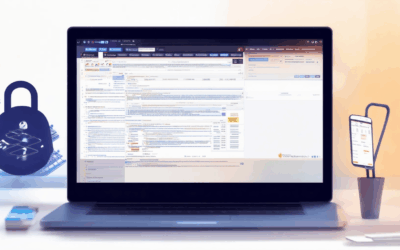In today’s interconnected world, safeguarding your business against evolving cyber threats has become more critical than ever. As digital security continues to shape the landscape of modern commerce, businesses must adopt robust measures to protect sensitive data, customer trust, and operational continuity. Whether it’s defending against ransomware attacks, phishing schemes, or data breaches, the stakes are high for organizations of all sizes. This comprehensive guide delves into the essential digital security practices that every business must prioritize, offering insights into how to assess vulnerabilities, implement effective safeguards, and stay ahead of potential threats. By exploring the latest cybersecurity trends, best practices, and tools, this article equips you with the knowledge needed to fortify your business against cyber risks and ensure long-term success in an increasingly secure environment.
Key Takeaways
– Implement Robust Encryption: Safeguard sensitive data and communications to protect customer information and maintain trust.
– Limit System Access: Restrict critical systems to authorized personnel only, enhancing protection against unauthorized access.
– Update Software Regularly: Keep all applications and OS updated to patch vulnerabilities and stay secure.
– Monitor Networks: Use advanced firewalls and IDS to detect and respond to suspicious activities promptly.
– Train Employees: Conduct cybersecurity awareness programs to empower staff to recognize and avoid threats.
– Backup Data Reliably: Establish secure backups and disaster recovery plans for quick data restoration.
– Respond to Incidents Swiftly: Develop a clear plan to contain, investigate, and resolve breaches efficiently, minimizing downtime.
This structured approach ensures each point is clear, keyword-rich, and highlights the benefits, aligning with SEO best practices and user engagement.

Essential Digital Security Measures for Businesses
Securing your business in the digital age requires a proactive approach to safeguarding sensitive data and operations. Here are seven critical digital security measures every business must implement:
- Encryption:** Protect all sensitive data, including customer information, through robust encryption methods. Ensure all communications, both internal and external, are encrypted to prevent unauthorized access.
- Access Control:** Limit access to critical systems and data to only authorized personnel. Implement multi-factor authentication (MFA) to enhance security beyond traditional passwords.
- Regular Software Updates:** Keep all software, applications, and operating systems up-to-date to patch vulnerabilities before they can be exploited. Enable automatic updates whenever possible.
- Network Monitoring:** Continuously monitor your network for suspicious activities, including unauthorized access attempts or data breaches. Use advanced firewalls and intrusion detection systems.
- Employee Training:** Educate your workforce on cybersecurity best practices, such as recognizing phishing attempts and using strong passwords. Regularly refresh security awareness training to keep employees informed.
- Data Backup and Recovery:** Implement regular backups of important data and establish a disaster recovery plan. Store backups securely, both physically and digitally, to ensure they can be restored quickly in case of data loss.
- Incident Response Plan:** Develop a clear plan for responding to security incidents, including containment, investigation, and resolution steps. Train your team to act swiftly and minimize downtime during breaches.
By adopting these measures, businesses can significantly reduce their risk of cyber threats and protect their assets effectively. For further insights and resources, visit BlindBrowser.com to explore comprehensive security solutions tailored to your needs.
Key Digital Security Practices Businesses Must Prioritize
Protecting your business from cyber threats requires a proactive approach. Here are the essential practices every organization should implement:
- Strong Passwords:** Use complex, unique passwords for every account and consider implementing multi-factor authentication (MFA) to enhance security.
- Regular Software Updates:** Keep all systems, applications, and software up-to-date to patch vulnerabilities before they can be exploited.
- Data Encryption:** Encrypt sensitive data stored both on-premises and in the cloud to prevent unauthorized access.
- Employee Training:** Regularly educate staff on cybersecurity awareness to reduce the risk of phishing attacks and other human error-related incidents.
- Data Backups:** Implement reliable backup solutions to restore lost data in case of ransomware attacks or accidental deletion.
- Continuous Monitoring:** Use advanced tools to monitor network traffic and detect suspicious activities in real-time.
- Secure Access Management:** Limit access to critical systems and regularly review and revoke permissions for former employees.
- Third-Party Vendor Management:** Ensure third-party vendors adhere to strict security standards and conduct regular audits.
By prioritizing these practices, businesses can significantly mitigate risks and safeguard their digital assets. Remember, staying vigilant and informed is the cornerstone of robust cybersecurity measures.
Learn more about protecting your digital presence with BlindBrowser

Why is Implementing Robust Digital Security Critical for Modern Businesses?
In today’s digital age, safeguarding your business from cyber threats is non-negotiable. Robust digital security protects sensitive data, safeguards intellectual property, and builds customer trust, all of which are essential for maintaining business continuity and staying ahead in the competitive market.
- Protection of Sensitive Data: With increasing cyberattacks, securing customer data, financial records, and proprietary information is paramount. A breach can lead to significant financial losses and reputational damage.
- Compliance and Regulatory Requirements: Many industries are subject to strict data protection regulations. Failing to implement robust security measures can result in hefty fines and legal consequences.
- Financial Stability: Cyber threats can disrupt business operations, leading to financial losses. Strong security practices minimize risks and ensure uninterrupted workflows.
- Customer Trust and Loyalty: Customers demand secure transactions and reliable services. Robust security measures build trust, fostering long-term relationships and repeat business.
- Competitive Advantage: Advanced security systems can differentiate a business from its competitors, attracting tech-savvy clients who prioritize safety.
Implementing robust digital security involves a multi-layered approach, including regular software updates, employee training, and advanced threat detection tools. Companies like BlindBrowser offer cutting-edge solutions tailored to meet modern security challenges. By prioritizing digital security, businesses can mitigate risks and thrive in an increasingly connected world.

Essential Digital Security Measures for Businesses
Securing your business in the digital age requires a proactive approach to safeguarding sensitive data and operations. Here are seven critical digital security measures every business must implement:
- Encryption:** Protect all sensitive data, including customer information, through robust encryption methods. Ensure all communications, both internal and external, are encrypted to prevent unauthorized access.
- Access Control:** Limit access to critical systems and data to only authorized personnel. Implement multi-factor authentication (MFA) to enhance security beyond traditional passwords.
- Regular Software Updates:** Keep all software, applications, and operating systems up-to-date to patch vulnerabilities before they can be exploited. Enable automatic updates whenever possible.
- Network Monitoring:** Continuously monitor your network for suspicious activities, including unauthorized access attempts or data breaches. Use advanced firewalls and intrusion detection systems.
- Employee Training:** Educate your workforce on cybersecurity best practices, such as recognizing phishing attempts and using strong passwords. Regularly refresh security awareness training to keep employees informed.
- Data Backup and Recovery:** Implement regular backups of important data and establish a disaster recovery plan. Store backups securely, both physically and digitally, to ensure they can be restored quickly in case of data loss.
- Incident Response Plan:** Develop a clear plan for responding to security incidents, including containment, investigation, and resolution steps. Train your team to act swiftly and minimize downtime during breaches.
By adopting these measures, businesses can significantly reduce their risk of cyber threats and protect their assets effectively. For further insights and resources, visit BlindBrowser.com to explore comprehensive security solutions tailored to your needs.
Essential Digital Security Measures for Businesses
Securing your business in the digital age requires a proactive approach to safeguarding sensitive data and operations. Here are seven critical digital security measures every business must implement:
- Encryption:** Protect all sensitive data, including customer information, through robust encryption methods. Ensure all communications, both internal and external, are encrypted to prevent unauthorized access.
- Access Control:** Limit access to critical systems and data to only authorized personnel. Implement multi-factor authentication (MFA) to enhance security beyond traditional passwords.
- Regular Software Updates:** Keep all software, applications, and operating systems up-to-date to patch vulnerabilities before they can be exploited. Enable automatic updates whenever possible.
- Network Monitoring:** Continuously monitor your network for suspicious activities, including unauthorized access attempts or data breaches. Use advanced firewalls and intrusion detection systems.
- Employee Training:** Educate your workforce on cybersecurity best practices, such as recognizing phishing attempts and using strong passwords. Regularly refresh security awareness training to keep employees informed.
- Data Backup and Recovery:** Implement regular backups of important data and establish a disaster recovery plan. Store backups securely, both physically and digitally, to ensure they can be restored quickly in case of data loss.
- Incident Response Plan:** Develop a clear plan for responding to security incidents, including containment, investigation, and resolution steps. Train your team to act swiftly and minimize downtime during breaches.
By adopting these measures, businesses can significantly reduce their risk of cyber threats and protect their assets effectively. For further insights and resources, visit BlindBrowser.com to explore comprehensive security solutions tailored to your needs.

Best Digital Security Practices for Businesses
Protecting your business from cyber threats requires a multifaceted approach. Here are the most effective digital security practices every organization should implement:
- Data Encryption : Safeguard sensitive information by encrypting data stored both on-premises and in the cloud. Use strong encryption algorithms to protect customer data, financial records, and intellectual property.
- Multi-Factor Authentication (MFA) : Implement MFA to ensure that accessing critical systems requires more than just a password. This significantly reduces the risk of unauthorized access even if passwords are compromised.
- Regular Software Updates : Keep all software applications, operating systems, and hardware devices updated to the latest versions. Patch management programs help identify and deploy updates promptly to mitigate vulnerabilities.
- Employee Cybersecurity Awareness Training : Educate your workforce on recognizing phishing attempts, social engineering tactics, and other common threats. Regular training programs can reduce human error-related breaches.
- Network Monitoring and Intrusion Detection Systems : Continuously monitor network traffic for suspicious activities. Use intrusion detection systems to detect and respond to potential breaches before they escalate.
- Access Control : Limit access to sensitive data and systems to only those who need it. Use role-based access controls to ensure that employees cannot view or modify data beyond their responsibilities.
- Backups and Disaster Recovery : Regularly backup critical data and maintain an offsite backup repository. Develop a disaster recovery plan to restore operations quickly in case of data loss or system failure.
- Third-Party Vendor Management : Vet third-party vendors and enforce strict security requirements. Ensure that external partners comply with your organization’s security policies to minimize exposure to vulnerabilities.
- Log Analysis and Threat Intelligence : Analyze logs from servers, firewalls, and other devices to identify patterns indicative of attacks. Use threat intelligence services to stay ahead of emerging threats and zero-day exploits.
- Physical Security Measures : Secure physical locations by limiting access to servers and sensitive areas. Use surveillance cameras and biometric authentication to prevent unauthorized entry.
- Compliance with Regulations : Adhere to industry-specific standards and legal requirements such as GDPR, HIPAA, or PCI-DSS. Non-compliance can result in hefty fines and damage to your reputation.
By implementing these practices, businesses can significantly reduce their risk of cyberattacks and safeguard valuable assets. Proactive measures like encryption, MFA, and employee training are essential in today’s digital landscape. Remember, staying vigilant and continuously improving your security posture is key to protecting your business from evolving threats.




